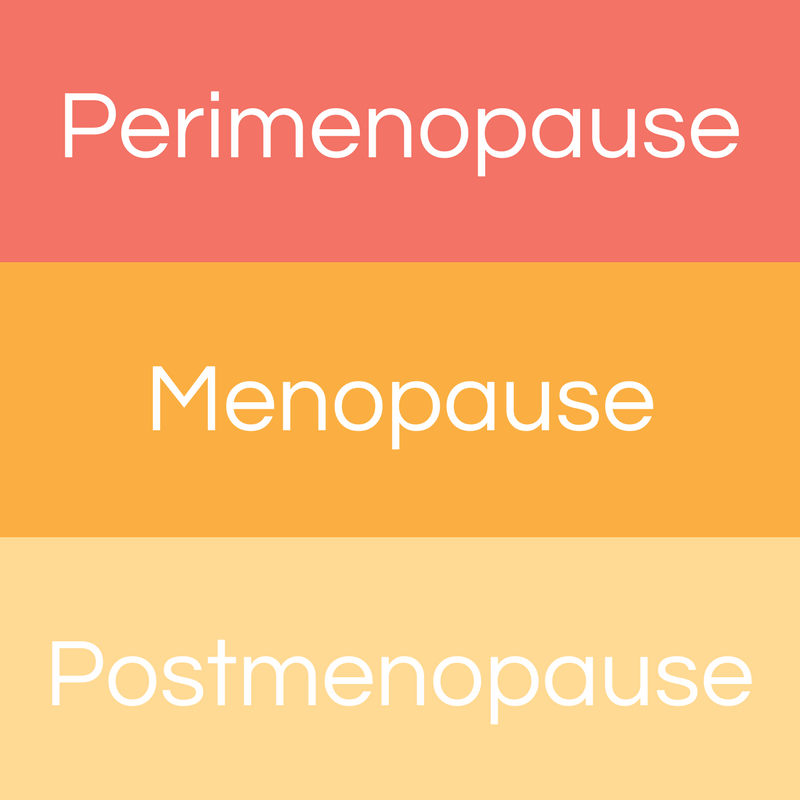
Perhaps the worst thing about menopause is feeling that it’s only happening to you.
It’s not.
Whether in the 40s or early 50s, millions of women are going through what you are right now all over the world.
Luckily, information is so readily available now it means you can fight back in ways that simply weren’t possible a couple of decades ago…
From online support groups and a wealth of useful information about health and treatment options, in many ways there has never been a better time to be menopausal.
Let’s consider what you can expect from the menopause transition. And more importantly, we’ll examine what you can do to tackle this distressing stage of life head on and come through victorious.
First, a brief breakdown of the menopausal 3 stages:
The 3 Stages of Menopause: Perimenopause, Menopause & Postmenopause

- Perimenopause: In the 10 years approaching menopause, your ovaries gradually start producing less estrogen
- Menopause: When you have not had a period for 12 consecutive months, you’re officially menopausal
- Postmenopause: Once the first year without menstruating has passed, you enter the postmenopausal stage of your life
We’ll take a look now at what you can expect in these various stages of the change before moving on to solutions at your disposal to combat them. (1)
The Scary Common Symptoms Associated With Various Stages Of Menopause
To avoid overlap, we’ll touch on symptoms that are more prevalent in each given stage rather than attempting an exhaustive list for each stage.
Perimenopause
Lasting anywhere from 4 years to a decade, this transitional phase is the lead-up to menopause and it can be extremely distressing. (2)
What will you probably experience during perimenopause?
- Irregular Periods: As you start edging toward menopause proper, even if you’ve had perfectly regular periods before, you might notice a great deal of uncertainty with your cycle. (3)
- Bloating and Weight Gain: As your hormones start to undergo a change and your ovaries slow down, you can experience weight gain as you nudge toward menopause. This is frequently accompanied by a feeling of being uncomfortably bloated. (4)
- Mood Swings: If you thought you were about to see the back of PMS, perhaps the continuing mood swings as you approach menopause come as something of a surprise. This is perfectly normal so don’t be caught unaware if hormones cause your emotions to be on a rollercoaster.
- Fluctuating Body Temperature: In the run-up to the hot flashes we’ll look at next, a gradual imbalance in your body’s internal temperature is perfectly normal during perimenopause.
Menopause
Once you’ve spent an entire calendar year without menstruating, you are now menopausal. (5)
We’ll look at the core 4 symptoms you can expect to deal with. (6)

- Hot Flashes: When your internal body temperature starts causing you to feel unbearably hot, you’re experiencing the menopausal hot flashes that blight the lives of around 75% of women during the change. This can also cause an increase in heart rate and night sweats. (7)
- Vaginal Dryness: After you have stopped menstruating, it’s commonplace to suffer from vaginal dryness and general discomfort during menopause. The change in estrogen levels leads to thinning of the vaginal walls. Urinary tract issues are also linked to problems you might face in this area.
- Insomnia: Sleep disturbance is an extremely common menopausal symptom. Hot flashes can disturb your normal sleep patterns while mood can further degrade sleep leading to insomnia. (8)
- Mood: During menopause, women can be at heightened risk of depression. As your estrogen levels continue to run riot and you become perhaps overwhelmed by the change in general, flagging mood is a regular symptom of menopause. (9)
Postmenopause
The bad news is that you’re not out of the woods with postmenopause.
Once we walk you through some issues frequently associated with this final stage, we will look at the good news – ways you can reduce the impact of these symptoms.
- Joint Pain: A combination of aging and entering the postmenopausal stage brings about a thinning of the bones which, in the worst scenario, can lead to osteoporosis. If your bones and joints start to ache, this is nothing to worry about unduly. Speak with your doctor to explore the issue further. (10)
- Cardiovascular Issues: Being postmenopausal does not directly bring about heart disease but it can place you at increased risk. If you’re noticing anything untoward with your heart rate or feel any chest pain, take action and see your healthcare provider.
- Postmenopausal Bleeding: If you thought you’d seen the end of your periods, you might not quite have finished bleeding. Over 30% of postmenopausal women report occasional bleeding long after the end of their menstrual cycle. (10)

What Can We Do To Face This Head On?
You should view the above symptoms with no alarm but a sense of satisfaction that you know what to expect so there are no sudden surprises.
This is the beauty of information…
Forewarned is forearmed.
When it comes to facing all stages of menopause head on, you have a huge range of options at your disposal.
- Natural Remedies
- Hormone Replacement Therapy
- Non-Hormonal Treatments Prescribed By Your Doctor
- Support Networks Online
- Face-to-Face Support Groups
- Friends and Family
Take the time to think about what makes sense for you.
If you are open to the idea of hormone therapy replacement (HRT), read as much as you can about the pros and cons then, if you’re satisfied, consider undergoing a course of treatment. Seek out a supportive healthcare provider to help you navigate HRT.
For many people and for varying reasons, HRT is not the best approach. If you fall in this group, there are natural remedies to ease your transition throughout every stage of menopause.
Don’t underestimate the power of talking about your problems with people who truly understand. Harness the network of friends and family you have in place. Form new networks through support groups.
We’d like to close on a truly positive note…
There are millions of other women struggling with various aspects of this change and there’s no reason at all to panic or feel overwhelmed. Settle on the best plan and follow it through, then ease out the other side feeling better and stronger and ready to fully embrace all that life has to offer.
REFERENCES
- https://www.ncbi.nlm.nih.gov/pubmedhealth/PMHT0023140/
- https://mysecondspring.ie/menopause/perimenopause
- http://www.scarymommy.com/10-ways-perimenopause-is-destroying-my-life/
- https://www.ncbi.nlm.nih.gov/pubmed/22978257
- https://www.ncbi.nlm.nih.gov/pubmedhealth/PMHT0023140/
- https://www.ncbi.nlm.nih.gov/pmc/articles/PMC4890704/
- https://www.hopkinsmedicine.org/healthlibrary/conditions/gynecological_health/introduction_to_menopause_85,P01535
- https://www.ncbi.nlm.nih.gov/pubmed/18652093
- https://www.ncbi.nlm.nih.gov/pubmed/16585467/
- https://www.ncbi.nlm.nih.gov/pubmed/22635014
- http://drayalonobgyn.com/postmenopause



